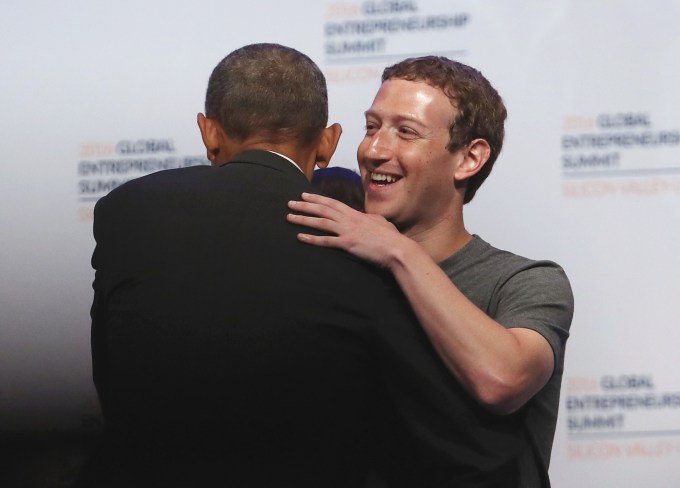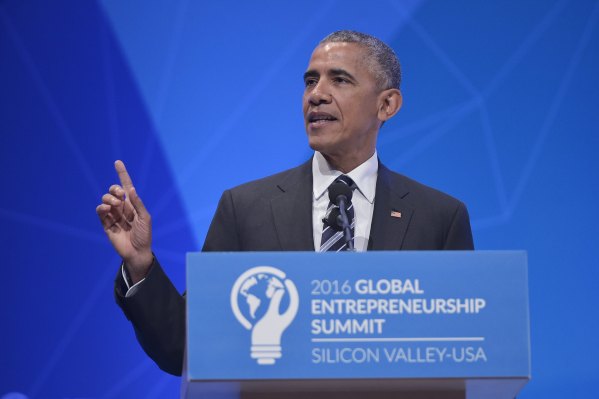President Barack Obama praised tech companies’ efforts to improve diversity in their workforces and called for governments around the world to embrace openness and transparency today at the Global Entrepreneurship Summit.
Obama encouraged companies to continue hiring workers from diverse backgrounds, citing tech companies’ diversity reports as a step in the right direction. The president also discussed censorship of the internet in Egypt and said international leaders need to welcome free speech rather than attempt to stifle it — even if that speech has negative effects.
“It turns out that starting your own business is not that easy. That it can be especially difficult for women and young people and minorities,” Obama said. “You deserve the same chance to succeed as everybody else.”
“Dozens of top tech companies are committing to make their technology workforces look like America,” Obama said, noting companies’ increased willingness to publish diversity data.
The president also welcomed 11 entrepreneurs from Cuba to the GES. The group is the first from Cuba to attend the summit, which has been held around the world since 2010. “Hola, mucho gusto,” Obama said, waving to the Cuban contingent from his podium onstage at Stanford University. Antonio Gracias, the founder of Valor Equity Partners and a member of the Presidential Ambassadors for Global Entrepreneurship (PAGE) program, funded travel for the group of Cuban entrepreneurs. “His support was critical in bringing these young Cuban entrepreneurs here,” Obama added.
During a discussion with Mai Medhat, the CEO of the Egyptian startup Eventtus, Obama mused on the international leaders’ willingness to censor the internet.
“It is hard to foster and encourage an entrepreneurial culture if it’s closed and if information flows are blocked. What we are seeing around the world oftentimes is governments wanting the benefits of entrepreneurship and connectivity, but also thinking top-down control is compatible with that, and it’s not,” Obama noted.
The president said his own experience with social media during the 2008 election shaped his attitudes about the openness of the internet. He described his 20-year-old advisors coming to him and telling him about “this new thing called Myspace,” and realizing how much potential social media had to shape the election.
“They had all this stuff that I had never heard of. And if I had tried to maintain control and said, ‘No, we’re going with pamphlets because I’m used to pamphlets and I can control what’s in the pamphlets,’ I might not be sitting here,” Obama said.
However, the internet has also become a potent tool for violent extremism, Obama noted, pointing to the recent mass shooting at a gay nightclub in Orlando as an example of online speech inciting violence. Violence shouldn’t deter governments from a commitment to openness online, the president said.
During his panel on entrepreneurship, Obama also made announcements about GES and the PAGE program: The next GES will be held in India, and several new members will join the PAGE program, including Spanx CEO Sara Blakely and Stripe CEO Patrick Collison.

Facebook CEO Mark Zuckerberg (R) hugs U.S. President Barack Obama during the 2016 GES. (Photo by Justin Sullivan/Getty Images)
Facebook CEO Mark Zuckerberg joined the panel to share advice with Medhat and other young entrepreneurs, including Laboratoria co-founder Mariana Costa Checa and Habona founder Jean Bosco Nzeyimana.
“I can’t wear a t-shirt like Mark for another six months, but I will take off my jacket so I don’t look so formal,” Obama joked as he welcomed Zuckerberg to the stage.
Zuckerberg used the panel to plug Facebook’s connectivity effort, Internet.org. “The main thing I’m focused on is connectivity,” he said. “If you grew up and never used a computer or had access to the internet, it’s hard to imagine what you’ve been missing out on. We need to do a better job of empowering folks in different countries to spread connectivity.”
He also noted that, when he started Facebook, he never expected it to grow into a massive company. He said that he expected another internet giant to build on his ideas about social media, and was told that Facebook was just a fad that would die out. He encouraged the young entrepreneurs in attendance to follow their dreams, saying that successful entrepreneurs “care fundamentally about the change they’re trying to create in the world and they’re not just in it to build a company.”
